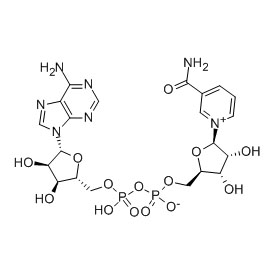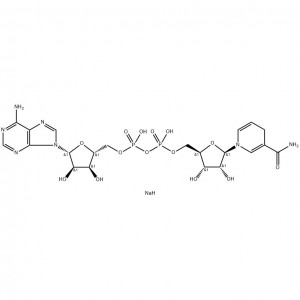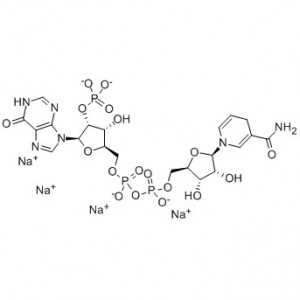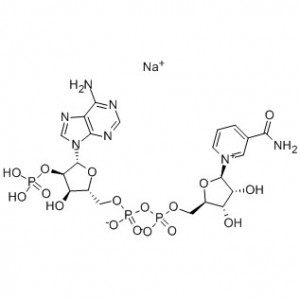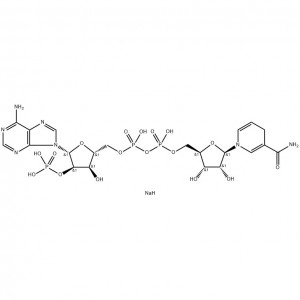β-Nicotinamide adenine dinucleotide (free acid) (NAD)
NAD is a very common coenzyme of dehydrogenase in living organisms. It participates in redox reactions in living organisms, and transports and transfers electrons for substances in the reaction. Dehydrogenase plays a decisive role in human metabolism. Some basic metabolic movements of the human body, such as protein decomposition, carbohydrate decomposition, and fat decomposition, cannot be carried out normally without dehydrogenase, and people will lose vital signs. And because the combination of NAD and dehydrogenase can promote metabolism, so NAD is an indispensable part of the human body. According to product usage, it can be divided into the following grades: biotransformation grade, diagnostic reagent grade, health food grade, API and preparation raw materials.
| Chemical Name | Nicotinamide adenine dinucleotide (free acid) |
| Synonyms | β-Nicotinamide adenine dinucleotide |
| CAS Number | 53-84-9 |
| Molecular Weight | 663.43 |
| Molecular Formula | C21H27N7O14P2 |
| EINECS号: | 200-184-4 |
| Melting point | 140-142 °C (decomp) |
| storage temp. | -20°C |
| solubility | H2O: 50 mg/mL |
| form | Powder |
| color | White |
| Merck | 14,6344 |
| BRN | 3584133 |
| Stability: | Stable. Hygroscopic. Incompatible with strong oxidizing agents. |
| InChIKey | BAWFJGJZGIEFAR-WWRWIPRPSA-N |
| Test Item | Specifications |
| Appearance | White to off-white crystalline powder |
| UV spectral analysis ε at 260 nm and pH 7.5 |
(18±1.0)×10³ L/mol/cm |
| Solubility | 25mg/mL 25mg/mL in water |
| Content(by enzymatic analysis with ADH at pH 10, using spectrophotometer, abs.340nm, on anhydrous basis) | ≥98.0% |
| Assay (by HPLC, on anhydrous basis) | 98.0~102.0% |
| Purity (by HPLC, %area) | ≥99.0% |
| Water content (by KF) | ≤3% |
Package: Bottle, Aluminum foil bag, 25kg/Cardboard Drum, or according to customer's requirement.
Storage Condition: Keep tightly stoppered in dark, for prolonged storage keep at 2~8℃.
Biotransformation grade: It can be used for the biocatalytic synthesis of pharmaceutical intermediates and APIs, mainly with catalytic enzymes, such as ketoreductase (KRED), nitroreductase (NTR), P450 monooxygenase (CYP), formate dehydrogenase (FDH) ), glucose dehydrogenase (GDH), etc., which can cooperate to convert various amino acid intermediates and other related drugs. At present, many domestic pharmaceutical factories have begun to apply biological enzyme replacement, and the market demand for NAD+ is growing rapidly.
Diagnostic reagent grade: Combined with a variety of diagnostic enzymes, as the raw material of diagnostic kits.
Health food grade: NAD is a coenzyme of dehydrogenase. It plays an irreplaceable role in glycolysis, gluconeogenesis, the tricarboxylic acid cycle, and the respiratory chain, plays an important role in energy production, and helps in the production of L-dopa, which becomes dopamine Neurotransmitters. Especially in recent years, it has been found that it is the "engine" and "fuel" in the process of cell damage repair. According to research, supplementation of coenzymes (including NMN, NR, NAD, NADH) in vitro can enhance the antioxidant capacity of tissue cells, inhibit apoptosis signaling, restore normal cell function, prevent disease occurrence or inhibit disease progression.
In addition, coenzymes can enhance the ability of immune response by activating and promoting the maturation of innate immune cells, producing anti-inflammatory factors and suppressing regulatory T cells.Nicotinamide dinucleotide oxidation state (NAD+) is a coenzyme found in all living cells. It plays an important role in hundreds of metabolic processes in cells, participates in thousands of physiological reactions, and is the most important member of the electron transport chain. Hydrogen donor; at the same time, coenzyme I acts as the sole substrate of related enzymes in the body, helping to maintain the activity of the enzymes.
Nicotinamide mononucleotide (NMN) is the precursor compound of nicotinamide adenine dinucleotide oxidation state (NAD+), which is involved in the synthesis of NAD in vivo. In 2013, Professor David Sinclair of Harvard Medical School found that with age, the cofactor coenzyme I (NAD+) level of longevity protein in the body continues to decline, which leads to the decline of mitochondrial function of the cell's "dynamo", triggering aging, and the various factors in the body. The malfunction of this kind of function is thus produced. According to his series of studies, the content of NAD+ in the human body decreases with age, resulting in accelerated aging from the age of 30, with wrinkles, muscle relaxation, fat accumulation, and diseases such as heart disease, high blood pressure, stroke, diabetes and Alzheimer's disease increased risk. The key to longevity is to increase the level of coenzyme I (NAD+) in the body, increase the rate of cell metabolism, and stimulate potential youthful vitality.
API and preparation raw materials: NAD+ is used in injections for drug addiction treatment/control, including NAD IV intravenous therapy implemented in the United States, Europe, Russia, South Africa, Mexico, South America, Southeast Asia and other countries. Pharmacy self-prepared products, similar to American pharmacies, can buy raw materials for dispensing by themselves, just like Chinese hospital preparations, it controls the quality of raw materials by itself, and prepares preparations into medicines.


